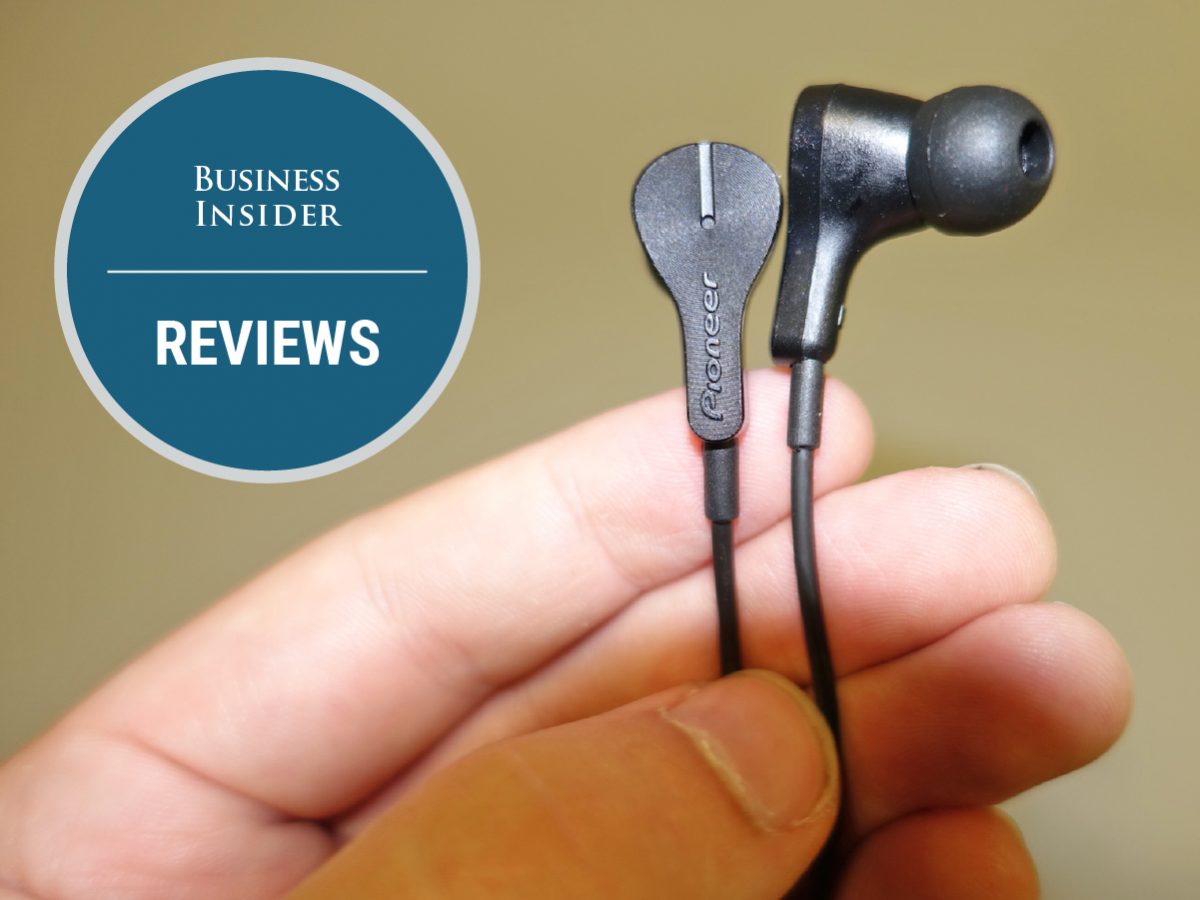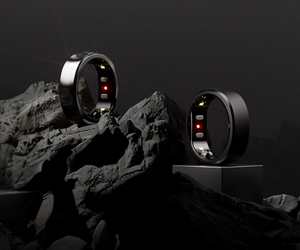
Pioneer Rayz Plus Review by Business Insider
-
These $150 noise-cancelling earbuds almost justify Apple killing the headphone jack
It’s been nearly a year since Apple ditched the headphone jack with the iPhone 7, and it’s still hard to say how consumers have benefitted.
Things seem to have worked out well for Apple – iPhone users by and large haven’t cared about the change, and the company’s big push into wireless headphones seems to have made its AirPods earbuds a hit. It doesn’t hurt that the company’s Beats subsidiary is the top seller of wireless headphones, either.
But the Bluetooth wireless standard remains an imperfect technology – it means another thing to recharge, occasional signal losses, and generally higher prices for the same quality of sound. And those drawbacks continue to dog any company’s wireless headphones.
Wires, for all their irksome tangling, still just work.

- Jeff Dunn/Business Insider
Thankfully, Apple still has a place for reliable wired audio on every iPhone: the Lightning port, the same thing you use to charge the device. Lightning is a digital connection, too, so it’s capable of doing many of the same “smart” tricks the audio world has explored in recent months.
Thus far, though, few companies have really tried to tap into Lightning’s potential. It makes sense: Going Lightning means limiting your market to Apple users, and wireless is where most of the industry’s growth is.
But now we’re finally starting to see some headphones make the case for why iPhone users should want a digital port like Lightning over the old-fashioned analog headphone jack.
Take, for instance, the Pioneer Rayz Plus, a $150 pair of Lightning earphones I’ve tested for the past few weeks. Though they look fairly unremarkable on the surface, they use Apple’s port to pack a handful of forward-looking features, many of which I’d expect to become standard for earphones of this type.
To give you a rundown of those features:

- Pioneer’s Rayz app is simple and straightforward.
- Jeff Dunn/Business Insider
• You get active noise cancelling without having the bulky external battery pack hanging from your cable that’s typically required for such tech. Pioneer says the Rayz Plus will adapt its level of noise cancelling to your surroundings, too, changing its intensity where appropriate.
• A “HearThru” feature allows the earphones let in a modicum of outside noise. If someone in the office has a quick question, for instance, you can turn this on and answer without having to take off the earphones and pause your music.
• An “Autopause” feature aims to let the Rayz Plus sense when they’re being taken out of your ears and, well, automatically pause whatever’s playing.
• A recently-added “Smart Mute” feature automatically mutes your line when you’re on a call and not talking, then un-mutes you when you start up again. This worked beautifully in my testing.
Not all of this needs a digital connection like Lightning to work, but Pioneer is also promising more updates in the future; a “Coming Soon” tab in the Rayz app currently says the earphones will soon be able to isolate your voice from background noise when you’re taking a call. Mainly, though, using Lightning means you neither have to recharge nor keep track of a dongle.
There are other clever design touches.

- Jeff Dunn/Business Insider
The four-button remote is a bit long, but has a “smart button” that can be used to turn on certain features or open a small number of apps. For instance, I set it so a single tap toggled noise cancelling, a double tap toggled HearThru, and a long press opened Apple Music.
It’d be nice if the remote could open any app, but this effectively lets you control everything without constantly having to go into Pioneer’s app. That’s ideal.
The remote also comes with its own Lightning port, which means you can actually recharge your iPhone while listening to music. (What a concept!)

- Jeff Dunn/Business Insider
This isn’t quite as fast as charging normally, and having a little connector at the end of the cable looks awkward, but it does work well. As far as I can tell, it’s also the only Lightning headphone to offer this.
Getting all of this functionality for $150 would seem to be a decent deal. Unfortunately, the Rayz Plus is a bit more appealing on paper than it is in practice.

- The Rayz Plus have microphones on the outside of the earpieces to help them do the audio processing necessary to make their advanced features work.
- Jeff Dunn/Business Insider
It’s not that it’s bad. The plastic earpieces don’t feel premium, but they’re light, and the whole thing is comfortable enough to wear.
They don’t create a terribly tight seal, so you’ll hear a fair amount of outside noise without turning the noise cancelling on, but that’s an easy enough fix. There are a whopping nine set of eartips in the box, too, so finding the right fit shouldn’t be too difficult.
Nothing here is sweatproof, though, so don’t go too hard if you take them on a run.
When it comes to actual audio quality, the Rayz Plus are fine. Not terrible, not great, just fine.

- Jeff Dunn/Business Insider
With its default EQ, the Rayz Plus have a balanced, largely clear sound. There’s a slight bump in the bass, which makes it a bit more suited for hip-hop than rock, and mids are fairly smooth.
The sound could use a bit more polish, though.

- Jeff Dunn/Business Insider
The biggest issue is the treble: It’s a bit too hot, so the crashing cymbals in a rock track like Jeff Rosenstock’s “To Be a Ghost” come off as too shrill and ill-defined for comfort. This can also lead to a bit too much sibilance on “ess” sounds; “stumbling” becomes “shtumbling,” and the “sh” part becomes somewhat harsh.
If I had to nitpick, I’d also say that the bass isn’t the tightest I’ve heard, and that the slight emphasis on the bass and treble makes the mids feel somewhat pushed back.
Compared to the excellent 1More Triple Driver – the $150 Lightning version, that is – the Rayz Plus just don’t lend as much space or width to most tracks. With a moodier song like Radiohead’s “No Surprises,” the 1More makes everything feel more expressive. Vocals are more present, the bass is more evenly handled, and there’s just more punch.
The Rayz Plus do have the advantage of being customizable — you can go into the app and make the sound emphasize bass, both bass and treble (what audiophiles call a “V-shaped” signature), or vocals (for podcasts and such).

- Jeff Dunn/Business Insider
This is nice to have, but the treble can be harsh enough without any boosting, and the bass tends to lose control when pushed too hard.
A hip-hop cut like Joey Badass’ “Ring the Alarm” sounds fun with the bass boosted, for instance, but the bassline itself becomes loose, and Joey’s vocals become too boomy.
To be clear, none of this sounds awful. There’s a level of detail here that you can’t get with Apple’s basic EarPods, which in turn mean the Rayz Plus sound better than the $159 AirPods.
But if you’re under the impression that Lightning automatically equals superior sound, don’t be. You can do better for the price.
The Rayz Plus’ other problem is that some of those smart features aren’t terribly effective.

- The Rayz Plus’ cable does well to not make any noise if it rubs up against you.
- Jeff Dunn/Business Insider
The noise-cancelling works, but it’s nowhere close to Bose’s level. Higher-pitch sounds can still seep their way through, even in quieter surroundings, and you’ll hear more of the engine rumbling on a long bus ride. The noise cancelling does have a tangible effect, for sure, but it’s only a “plus” if you look at it like a nice bonus, not a selling point.
The “HearThru” and “Autopause” features, meanwhile, could use a little more work. The former works for overhearing announcements on the train, but requires you to lower the volume to an unlistenable level to hear anything other people are saying. You might as well just pause the music entirely.
The latter, meanwhile, was very spotty in my testing; sometimes it’d work, other times it wouldn’t.
The Rayz Plus are quietly one of the more interesting headphones that’ve launched this year. They’re competent, and they have plenty of good ideas. But they don’t quite put those ideas into a delightful, cohesive whole.

- Jeff Dunn/Business Insider
The basics are still mostly inoffensive, so if you’re an early adopter type who is eager for a multifunctional pair of Lightning headphones, I could see you being content.
For most, though, the Rayz Plus are the first step toward a type of headphone that’s still waiting to be justified.



Leave a comment